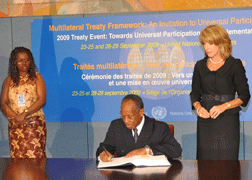
TAIPEI, Taiwan: St. Vincent and the Grenadines this month signed the Convention on Cluster Munitions (CCM) and ratified the Comprehensive Nuclear-Test-Ban Treaty (CTBT).
The CTBT intends to bring a permanent end to nuclear test blasts while the Cluster Munitions Coalition is working to protect civilians from the effects of cluster munitions by promoting universal adherence to and full implementation of the CCM.
Minister of Foreign Affairs Sir Louis Starker signed the CCM in New York this week, making SVG the second Caribbean nation to join the ban.
Sir Louis, who is also Deputy Prime Minister and Minister of Commerce and Trade, deposited the CTBT instrument of ratification with the United Nations Secretary-General in New York.
The Cluster Munitions Coalition noted that while the Caribbean does not stockpile weapons, cluster bombs were used in Grenada by the United States during the 1982 insurrection.
Jamaica was the first Caribbean nation to sign the convention and the Coalition said that the Caribbean has an important role to play in renouncing cluster munitions by joining the ban.
It said that this role was as important as the region’s joining in banning anti-personnel landmines through the 1997 Mine Ban Treaty, which all Caribbean nations have all signed.
“We’re very encouraged to know that world leaders meeting in New York this week are including the global ban on cluster bombs in their list of priorities,” CMC Coordinator said.
“We hope the sense of possibility and the partnership between civil society and governments that characterized the process to achieve this treaty will inspire progress on all of the crucial issues facing the world today,” he added.
The Convention on Cluster Munitions is being showcased at the United Nation’s annual treaty event.
It is open for signature and ratification by world leaders gathered at the General Assembly.
Cyrus also signed the ban this week bring to 100 the number of signatories.
The CCM said that more states were expected to deposit their instruments of ratification in the coming days
SVG’s ratification of the CTBT comes three months after it signed on July 2.
The ratification came as US President Barack Obama told the United Nations General Assembly that US U.S. Secretary of State Hillary Clinton will be the first senior representative of the United States at the conference to promote the entry into force of the Treaty.
“We will move forward with ratification of the Test-Ban Treaty, and work with others to bring the Treaty into force so that nuclear testing is permanently prohibited”, he said.
Of the 33 in Latin America and the Caribbean sates, 30 have signed and 29 have ratified the CTBT. The three non-signatories are Cuba, Dominica and Trinidad and Tobago. Overall, 181 states having signed the treaty.





